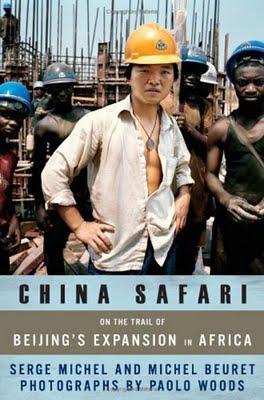China Safari: On the Trail of Beijing’s Expansion in Africa

In China Safari: On the Trail of Beijing's Expansion in Africa, Serge Michel and Michel Beuret invest a lot of time and energy in examining China’s presence in African countries. They travel to various places to interview different people in order to find out what affects Chinese business has across the continent. China is quickly colonizing African counties with a speed that must make Western colonizers like America, England, and France (to name a few) burn with envy.
The environment doesn’t matter, the people don’t matter, and future generations certainly don’t either. What is important is the almighty dollar—er, yuan. Nobody and nothing is indispensable. Even the average Chinese laborer who travels from the mainland to work the fields, factory, pipelines, and mines is expendable. He makes more money in the Congo than he ever could in China, and as an added bonus, if he dies in a work-related accident, it will net his family back home a few extra yuan—so his death isn’t seen as a complete waste, but an honorable sacrifice.
It isn’t just the natural resources that China is trying to take as it competes with Western countries for contracts. African governments favour doing business with China and give construction contracts to Chinese companies. In return, all these nations have to do is hand over a bit of oil, which then increases the need for construction of more pipe lines. (More contracts for China!), or other enviable resources—like Niger's uranium. China may give out loans to build dams and highways, but the money comes with a cost: Chinese labor is preferred instead providing jobs for local people, the construction quality is poor, and there are no unions to protect the workers.
Also, Chinese businesses have made, and continue to make, a lot of money off of selling their cheap manufactured goods to African consumers. Whatever the consumer needs, from Islamic prayer mats to plastic souvenirs sold by the Nile River to rifles and handguns for regional warring, China makes all of the items at a cheaper cost than its competitors.
The information China Safari offers about the Chinese exploitation of African (and Chinese) workers is a hefty wake up call for those in the pursuit of global fair trade and environmental and human rights. The bleak reality of industrial “progress” in places across the African continent are well-documented in this book__. The authors leave no stone unturned. The amount of research they did for this book is staggering, and I was shocked to read just how deeply China has sunk its claws into the world's poorest continent.